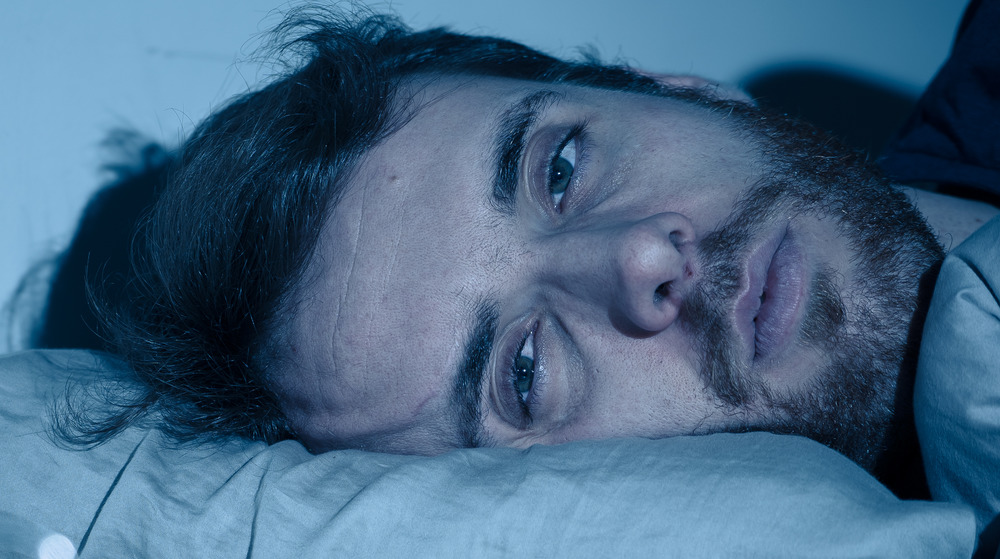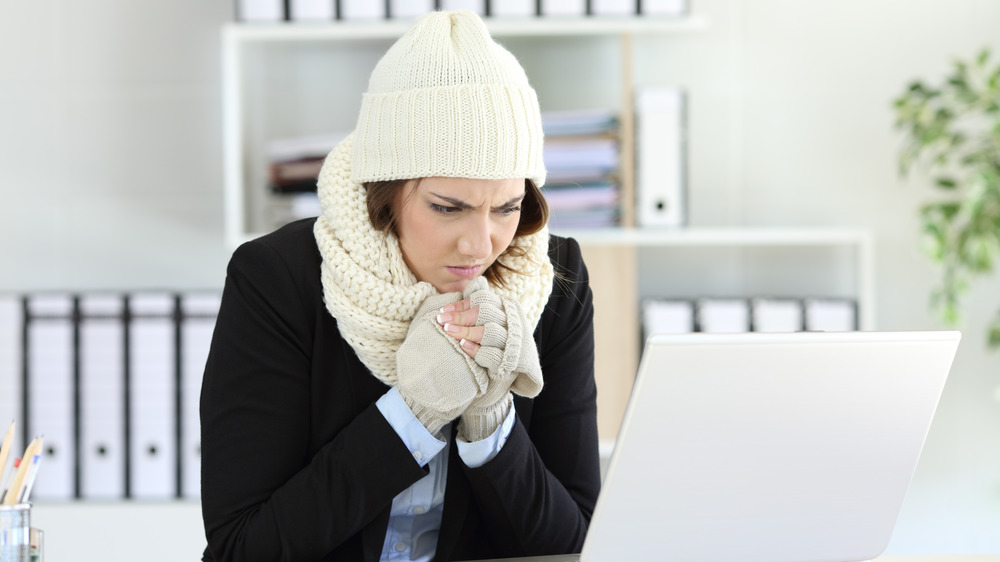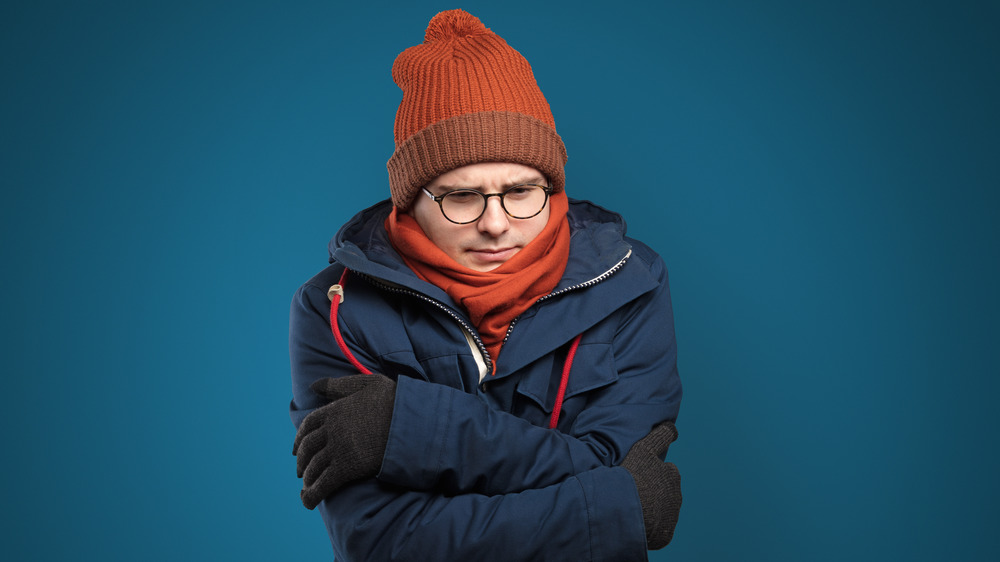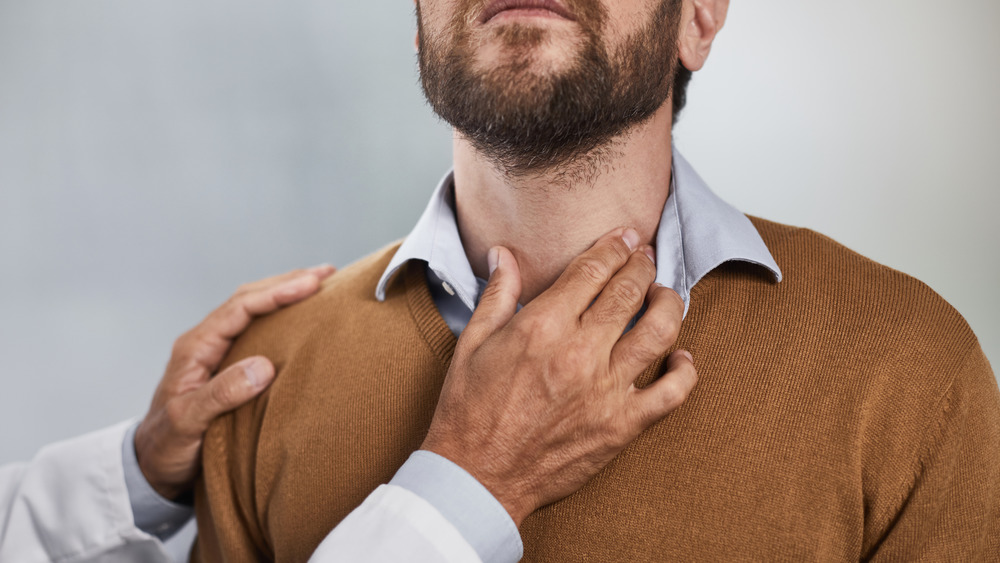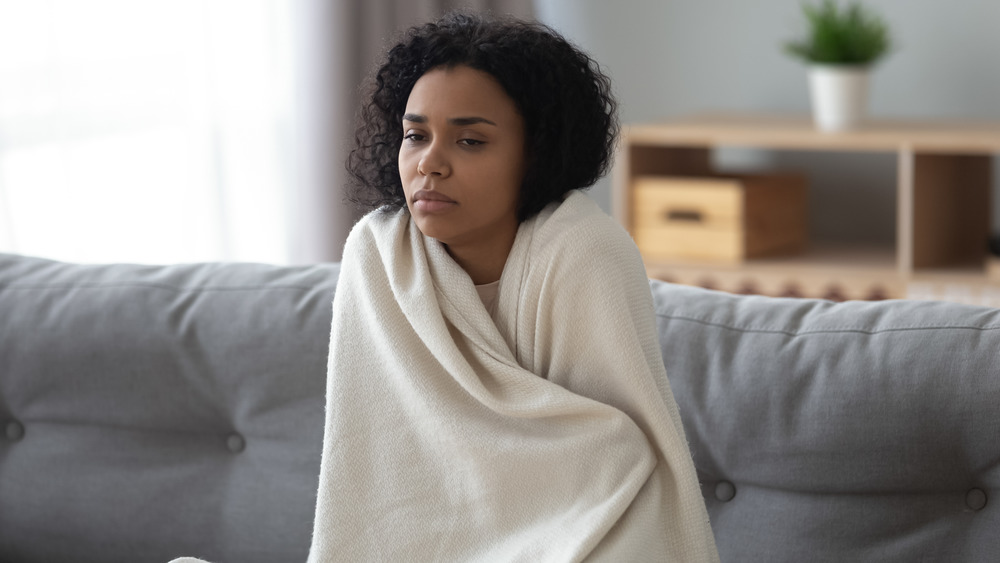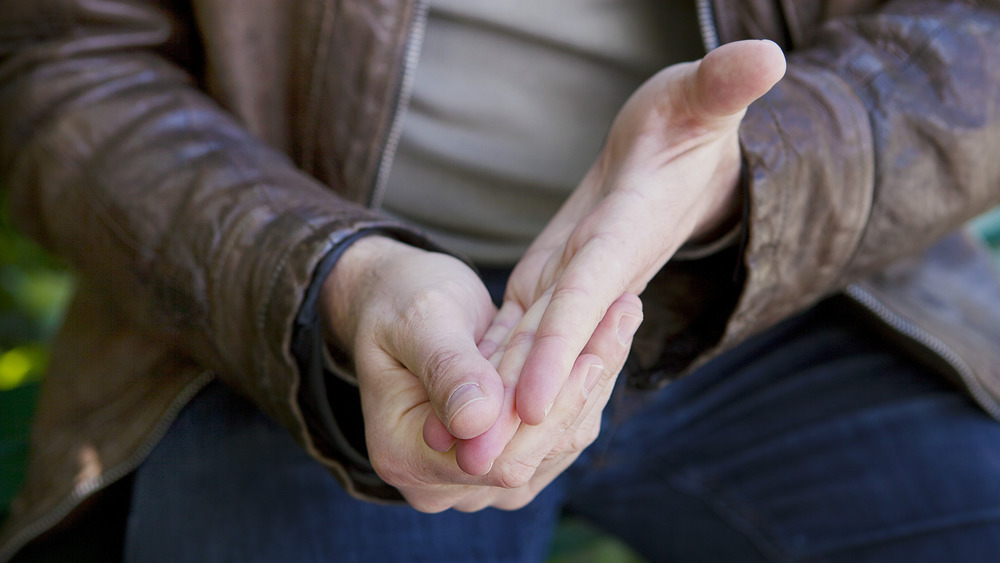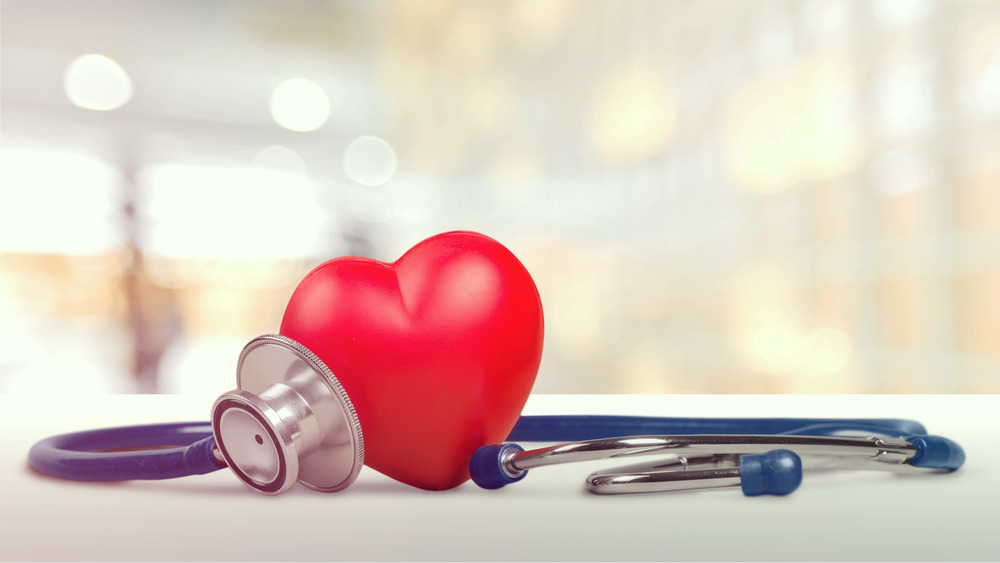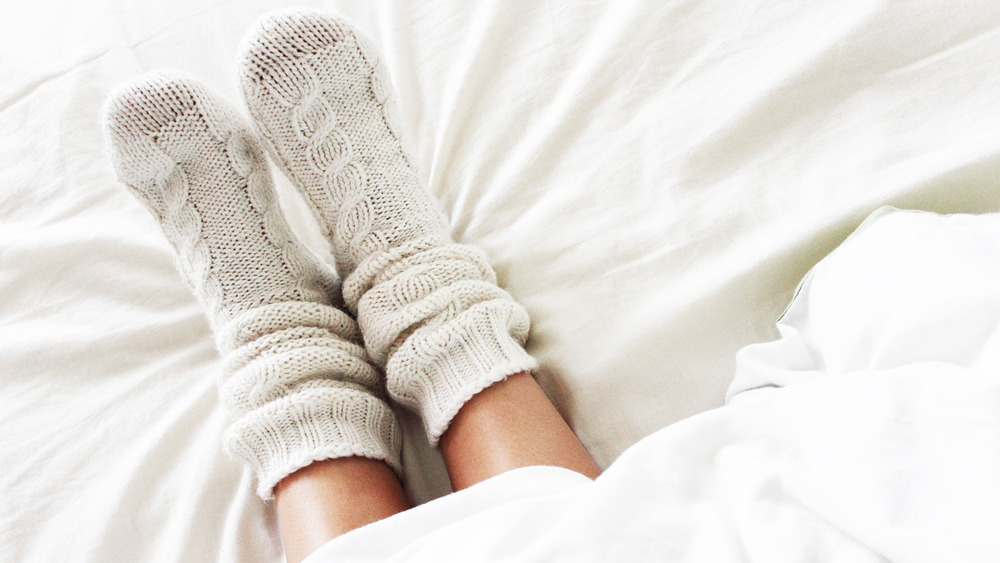What Feeling Cold All The Time Really Means
If you're always cold, can you blame the air conditioning, the season, or those drafty windows? You may also be able to blame your coldness on your genetics. A 2012 study of twins published by Cambridge University Press found that cold hands and feet is "highly heritable." We, ourselves, could also be to blame. As The Conversation noted, we have gotten very used to comfortable temperatures. "In the developed world we rarely expose ourselves to cold, letting expensive clothing protect us from outdoor cold and letting power companies warm our living and working spaces," the site explained.
These may be some obvious causes of feeling like an extra in Frozen, but what if there's something else going on? Certain conditions or behaviors can result in making you yearn for a sauna but, when addressed, can have you feeling normal again. Here's a look at what it could mean if you're cold all the time.
Your lack of sleep may be causing you to feel cold all the time
It's a well-known fact that sleep is important. But did you know that one of its purposes is to regulate body temperature? As the National Sleep Foundation explained, not getting enough sleep can make you feel cold all over. The American Academy of Sleep Medicine (AASM) recommends that adults get at least seven hours of sleep every night. If you're getting less than that, try to improve your sleep habits. This means a consistent, nightly bedtime.
AASM has provided a list of tips to help poor sleepers establish healthy sleep habits. It includes advice like turning off your phone, TV, or other electronics at least a half hour before going to bed, avoiding caffeine in the evening, reserving your bed for only sleep and sex, and avoiding eating a big meal before hitting the hay. If changes to your sleep habits don't help you to get more rest — and feel warmer — it's a good idea to talk to your doctor.
You may feel cold all the time if you're slim
According to a 2010 study published in Population Health Metrics, subjects who were slimmer were cold more often than those with higher body mass indexes (BMIs). A lower BMI can also mean poor circulation, which affects body temperature. The study's conclusion states, "We found that thermal discomfort with cold extremities occurs at highest intensity in younger, slimmer women and lowest in elderly, stouter men."
If you're underweight or not getting enough nutrition, your body won't be able to generate enough heat to keep you warm and you'll be hypersensitive to cold. People with eating disorders, like anorexia, may notice this.
You might also want to start lifting weights, as building muscle will help with body heat. As New Scientist reported, muscles play a role in keeping the body warm by contracting and triggering shivering. Muthu Periasamy of Ohio State University told the publication, "Our findings demonstrate for the first time that muscle, which accounts for 40 percent of body weight in humans, can generate heat independent of shivering."
Recent weight loss could cause you to feel cold all the time
"I used to be heavy and was always warm. Now, after losing weight, I am always cold. Why?" A reader posed this question to The New York Times. The answer is related to losing part of the body's insulation in the form of "unwanted body fat." Cold intolerance is a "frequent complaint" among people who have lost a lot of weight, The New York Times said in its reply. It's often listed as one of the changes experienced after undergoing gastric sleeve surgery. After all, the body is adjusting to rapid weight loss.
"The body's core has lost a significant part of its protection against heat loss," explained The New York Times. "The problem is usually worse for those who become very thin, especially small women. While someone is losing weight through severe calorie restriction, the metabolism may slow down to protect the body's heat-producing store of calories, leading to a cold feeling."
You may feel constantly cold if you have an underactive thyroid
When the thyroid gland can't make enough thyroid hormone to keep the body running normally, this results in a condition called hypothyroidism, as defined by the American Thyroid Association (ATA). In case you were wondering, the thyroid gland is normally located in the lower front of the neck. The hormones it secretes into the blood are carried to every tissue in the body. "Thyroid hormone helps the body use energy, stay warm, and keep the brain, heart, muscles, and other organs working as they should," the ATA explained.
There are a number of worrying symptoms that can occur as a person's biological processes begin to slow. They include feeling tired, feeling cold, dry skin, constipation, as well as forgetfulness and depression. But because these symptoms can vary from person to person, there's only one way to confirm a diagnosis of hypothyroidism: a blood test for thyroid-stimulating hormone, or TSH.
Anemia can make you feel cold all the time
The American Society of Hematology (ASH) asserts that anemia is the most common blood disorder, affecting more than 3 million Americans. If you don't have enough red blood cells or your red blood cells aren't working properly, this means you're short on iron and your body lacks oxygen. This can result in cold hands or feet. Other symptoms include weakness, fast or irregular heartbeat, pale or yellow skin, and headache.
"Many people are at risk for anemia because of poor diet, intestinal disorders, chronic diseases, infections, and other conditions," ASH explained. "Women who are menstruating or pregnant and people with chronic medical conditions are most at risk for this disease. The risk of anemia increases as people grow older." According to ASH, anemia is diagnosed when a blood test shows a hemoglobin value of less than 13.5 gm/dl in a man or less than 12.0 gm/dl in a woman, with normal values for children varying with age.
Could kidney disease be the reason you're feeling cold all the time?
Feeling cold or having episodes of chills could be symptoms of kidney disease, Next Generation of Clinical Research (NICR) explained. "Kidneys are responsible for producing a hormone called erythropoietin, which signals the body to bring in oxygen-carrying red blood cells," according to NICR. Low production of this hormone can result in anemia due to kidney disease.
According to Johns Hopkins Medicine, one in three adults in the U.S. is at high risk for developing kidney disease. In describing the symptoms, the medical center revealed that the anemia from kidney disease "can make the body feel cold even when in a warm room." That pretty much sums it up.
Feeling cold isn't the only symptom of kidney disease, though. Others include swelling, fatigue, skin rash/itching, metallic taste in the mouth, shortness of breath, nausea, changes in urination, dizziness, and trouble concentrating. The leading cause of kidney failure (the final stage of chronic kidney disease) is diabetes, with high blood pressure being the second leading cause, Johns Hopkins Medicine revealed. Kidney disease is also connected to heart disease, and age is a risk factor.
If your fingers are numb and cold, you may have this condition
If you've noticed that your fingers and toes have a tendency to feel numb and cold, you could have Raynaud's disease. This condition causes some areas of your body to respond this way to cold temperatures or stress. "Smaller arteries that supply blood to your skin become narrow, limiting blood flow to affected areas," explained the Mayo Clinic.
If you're a woman or live in a colder climate, you're more likely to have Raynaud's disease. During what's called an "attack," affected areas of your skin may turn white before turning blue and feeling cold and numb. As you warm up, they may turn red, throb, tingle, or swell. Other areas of the body can be affected, like your nose, ears, and even nipples. For most people, Raynaud's disease isn't disabling, according to the Mayo Clinic, but it can affect your quality of life.
To prevent such attacks, you should take certain precautions before venturing out into the cold. The Mayo Clinic recommends things like warming up your car and bundling up in the winter months. You'll also want to take precautions against the cold inside your home — regardless of the season. This may mean putting on gloves before getting something out of the fridge or wearing socks and mittens to bed.
Chronic dehydration can make you feel cold all the time
"If you lose just 1.5 percent of the water in your body, you've reached the tipping point of dehydration," according to Health. And dehydration isn't just about not drinking enough. Sometimes it can be the result of diarrhea, vomiting, sweating or urinating too much, or having a fever. A recognizable symptom is feeling thirsty, but if you let it go on too long, you can lose consciousness.
Not having enough fluids can actually make you cold because your body starts to limit blood flow to the skin, as Luga Podesta, a sports medicine specialist, told Health. "In addition, water holds heat, so if you become dehydrated it can be more difficult to regulate your body temperature, which can make you get chilly faster, even when you're not in a cold environment," he added.
Although you may think of dehydration as something to watch out for in the summer, it's often easier on hot days to remember to drink more. This means dehydration can be even more of a threat in cold weather. And dehydration can happen quicker than you'd think, CNET reported. The best precaution is to be prepared: Wear the proper gear when you're outdoors and stay properly hydrated.
Check your medication if you start feeling cold all the time
Feeling cold could be a side effect of a medication you're taking. Beta blockers — which treat high blood pressure and other cardiovascular issues — are one example, according to Healthline. You may especially feel the cold in your fingers or toes. As the U.K.'s National Health System explained, beta blockers "may affect the blood supply to your hands and feet."
Harvard Health pointed out that taking lower doses of beta blockers will then have a lower chance of causing side effects. That's why the tricky part of taking beta blockers is finding the right dosage to manage your health and avoid as many pesky side effects as possible. Note that you need to be just as careful stopping a beta blocker as starting one. Always consult with your healthcare provider.
Your age may have something to do with you feeling cold all the time
Add this to the list of things to deal with as you age: increased sensitivity to cold. As The New York Times explained, there are a few reasons for this. When you get older, the heat-retaining layer of fat under your skin starts to get thinner, while your blood vessels' walls also lose their elasticity. All that adds up to your body conserving less heat and a drop in blood circulation — and feeling colder more often, and more easily. A 2011 study published in The Journals of Gerontology found that average body temperature was found to be significantly lower in older age groups.
Feeling cold may be frustrating enough, but it can also be dangerous. Because age makes older adults more susceptible to feeling cold, they're at risk for developing hypothermia, cautioned Berkeley Wellness. This doesn't mean that it has to be subzero outside. An indoor temperature of 60-65 degrees Fahrenheit can do it.
Fortunately, the remedy here couldn't be simpler: wear the right kinds of clothes to help you stay warm! For instance, when you wear a hat, make sure it's one that totally covers your head — and that includes your ears. Berkeley Wellness explained: "You lose about 30 percent of your body heat through your head."
This may be why you always feel cold after eating
Have you ever found that you're freezing after eating dinner? Temperatures of foods can affect our feelings of hot and cold," registered dietitian Nora Saul surmised in a HealthyWomen Q&A.After all, there's a reason we especially like having popsicles and ice cream in the summer. There may be more to it than that, though.
"During digestion, blood is directed away from the muscles and tissues and toward the digestive system," Saul explained. "If you were physically active before eating your meal, which generates heat, and then stopped and ate, the combination of heat lost due to digestion and the loss of blood flow to the skin may cause you to feel cold."
If you're always cold, try eating some iron-rich foods like lean beef and poultry or, if you're a vegetarian, lentils, soybeans, tofu, greens, sunflower seeds, and pistachios, Elite Daily suggested. Citrus fruits are recommended because they contain vitamin C, which allows the body to absorb iron and other nutrients. Complex carbs and bean soups are also helpful.
Feeling cold all the time can point to peripheral artery disease
Peripheral artery disease (PAD) occurs when plaque builds up in the arteries that carry blood to the rest of the body, explained Medical News Today. This is also known as atherosclerosis. What this does is narrows the arteries, making it more difficult for blood to flow through. As a result, there's less blood flow to the extremities, "creating a feeling of coldness, numbness, tingling, or pain in the hands, feet, or both."
The American Heart Association warns that many people mistake the symptoms of PAD for other conditions, and it often goes undiagnosed by healthcare professionals. People with PAD are a higher risk for coronary artery disease, heart attack, or stroke. Factors that can increase your chances for PAD include age, high blood pressure or high cholesterol, smoking, and diabetes. But diagnosing PAD is easy and painless, according to the American Heart Association. In some cases, it can even be managed with lifestyle changes and medication.
Feeling cold all the time may simply be due to your sex
Women tend to feel colder than men. There are several reasons for this. One study found that women's hands and feet are colder by some 2.8 degrees Fahrenheit (via National Geographic). Women also have lower resting metabolic rates than men, as found in a study published in the Journal of Applied Physiology. In fact, men actually have a metabolic rate that's about 23 percent higher than women's. This means that a faster metabolism leads to more heating up of the body and explains why men are able to eat more without gaining weight.
A third reason women may feel colder than men can be tied to hormonal birth control. Women already have higher core body temperatures than men, according to a study published in JAMA. Ironically, oral contraceptives (birth control pills) can raise a woman's body temperature further, making her more sensitive to the cold.
This is what you should do if you suddenly start feeling cold all the time
You know your body the best, so if you feel like something is off, talk to a healthcare provider. As Dr. Natalie Azar, a rheumatologist at NYU Langone Health told Woman's Day, "If you've been cold your whole life and that's just you, that's great. But if feeling cold is a new sensation you should have that checked out." If feeling cold is associated with shaking chills, fever, or if your body temperature is lower than normal, she advises seeking medical attention.
In the meantime, there are some ways to get yourself warm. WebMD suggested heating up your clothes in the dryer, wearing layers, exercising, and using a space heater. The site also advised wearing socks to bed or at least warming up your feet in slippers for an hour before calling it a night.

